浙江省桐乡市凤鸣高级中学2017-2018学年高二上学期期中考试英语试卷
2017-2018学年高二英语上学期期中试题_15
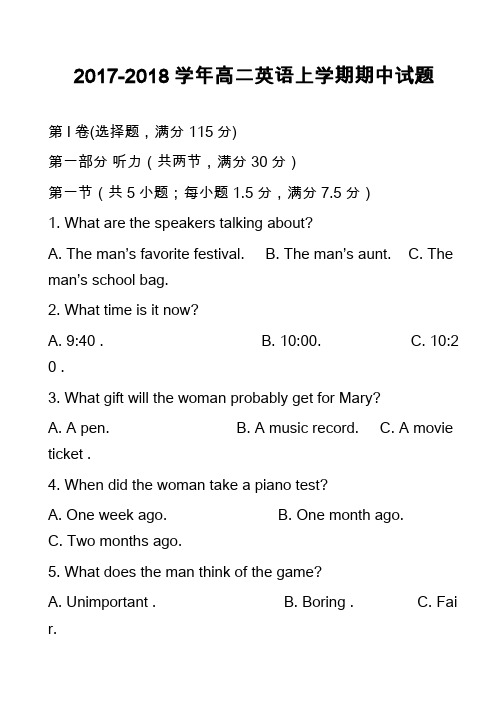
2017-2018学年高二英语上学期期中试题第I卷(选择题,满分115分)第一部分听力(共两节,满分30分)第一节(共5小题;每小题1.5分,满分7.5分)1. What are the speakers talking about?A. The man’s favorite festival.B. The man’s aunt.C. The man’s school bag.2. What time is it now?A. 9:40 .B. 10:00.C. 10:20 .3. What gift will the woman probably get for Mary?A. A pen.B. A music record.C. A movie ticket .4. When did the woman take a piano test?A. One week ago.B. One month ago.C. Two months ago.5. What does the man think of the game?A. Unimportant .B. Boring .C. Fai r.第二节(共15小题;每小题1.5分,满分22.5分)听第6段材料,回答第6、7题。
6. Where are the dictionaries?A. On the top shelf.B. At the bottom of the shelf.C. On the second shelf from the top.7. What does the man need?A. Books on grammar.B. Books for conversation practice.C. Books for reading practice.听第7段材料,回答第8至9题。
8. How many classes does the woman have this afternoon?A. Two.B. Three.C. Four.9. What will the man be doing at 5:00 this afternoon?A. Having a meeting.B. Having a class.C. Talki ng to his secretary.听第8段材料,回答第10至12题。
2017-2018学年高二上学期期中考试英语试题(有答案)
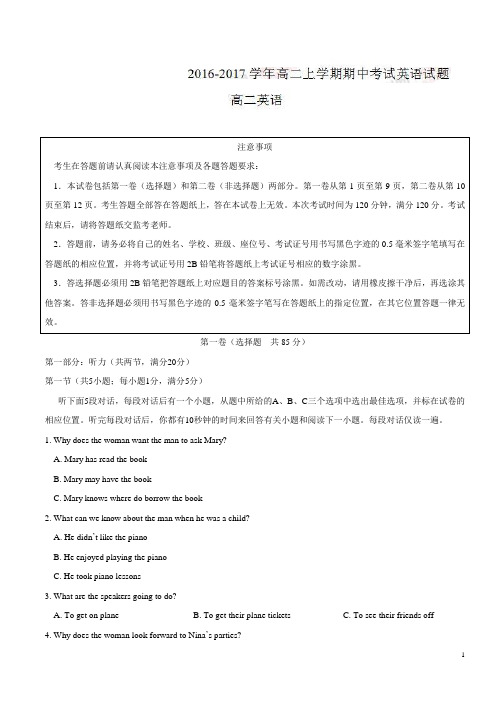
注意事项考生在答题前请认真阅读本注意事项及各题答题要求:1.本试卷包括第一卷(选择题)和第二卷(非选择题)两部分。
第一卷从第1页至第9页,第二卷从第10页至第12页。
考生答题全部答在答题纸上,答在本试卷上无效。
本次考试时间为120分钟,满分120分。
考试结束后,请将答题纸交监考老师。
2.答题前,请务必将自己的姓名、学校、班级、座位号、考试证号用书写黑色字迹的0.5毫米签字笔填写在答题纸的相应位置,并将考试证号用2B铅笔将答题纸上考试证号相应的数字涂黑。
3.答选择题必须用2B铅笔把答题纸上对应题目的答案标号涂黑。
如需改动,请用橡皮擦干净后,再选涂其他答案。
答非选择题必须用书写黑色字迹的0.5毫米签字笔写在答题纸上的指定位置,在其它位置答题一律无效。
第一卷(选择题共85分)第一部分:听力(共两节,满分20分)第一节(共5小题;每小题1分,满分5分)听下面5段对话,每段对话后有一个小题,从题中所给的A、B、C三个选项中选出最佳选项,并标在试卷的相应位置。
听完每段对话后,你都有10秒钟的时间来回答有关小题和阅读下一小题。
每段对话仅读一遍。
1. Why does the woman want the man to ask Mary?A. Mary has read the bookB. Mary may have the bookC. Mary knows where do borrow the book2. What can we know about the man when he was a child?A. He didn‘t like the pianoB. He enjoyed playing the pianoC. He took piano lessons3. What are the speakers going to do?A. To get on planeB. To get their plane ticketsC. To see their friends off4. Why does the woman look forward to Nina‘s parties?A. The food is goodB. There are many friendsC. The music is great5. What‘s the probable relationship between the speakers?A. Boss and clerkB. Interviewer and intervieweeC. Teacher and student第二节(共15小题;每小题1分,满分15分)听下面5段对话或独白。
2017—2018学年度第一学期期中考试高二年级英语试题
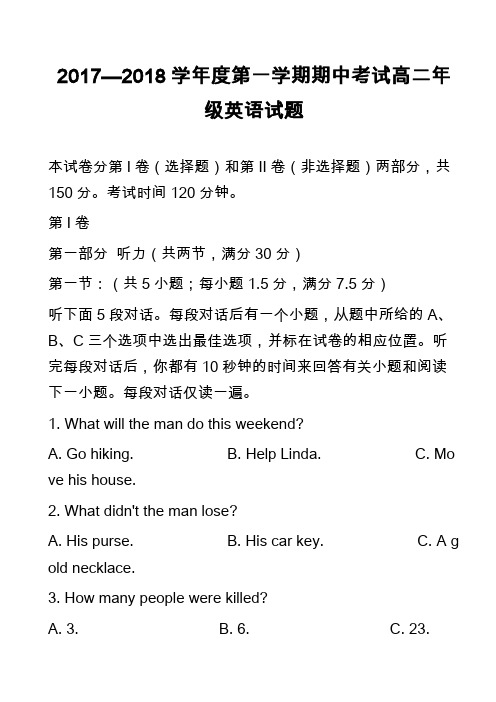
2017—2018学年度第一学期期中考试高二年级英语试题本试卷分第I卷(选择题)和第II卷(非选择题)两部分,共150分。
考试时间120分钟。
第I卷第一部分听力(共两节,满分30分)第一节:(共5小题;每小题1.5分,满分7.5分)听下面5段对话。
每段对话后有一个小题,从题中所给的A、B、C三个选项中选出最佳选项,并标在试卷的相应位置。
听完每段对话后,你都有10秒钟的时间来回答有关小题和阅读下一小题。
每段对话仅读一遍。
1. What will the man do this weekend?A. Go hiking.B. Help Linda.C. Mo ve his house.2. What didn't the man lose?A. His purse.B. His car key.C. A g old necklace.3. How many people were killed?A. 3.B. 6.C. 23.4. What is the woman's neighbor like?A. Friendly.B. Polite.C. Unkind.5. How long is the library open on weekends?A. For seven hours.B. For eight hours.C. For nine hours.第二节:(共15小题;每小题1.5分,满分22.5分)听下面5段对话或独白。
每段对话或独白后有几道小题,从每题中所给的A、B、C三个选项中选出最佳选项。
听每段对话或独白前,你将有5秒钟的时间阅读每小题,听完后,每小题将给出5秒钟的作答时间。
每段对话或独白读两遍。
听下面一段对话,回答第6和第7两个小题。
6. What's wrong with the boy?A. His leg got hurt.B. His head got hurt.C. His arm got hurt.7. Who was driving the car when the accident happened?A. The boy.B. The boy's mother.C. Th e boy's father.听下面一段对话,回答第8和第9两个小题。
2017~2018学年第一学期高二英语期中试题

2017~2018学年第一学期高二英语期中试题第一部分听力(共两节,满分15分)第一节(共5小题;满分2.5)听下面5段对话。
听完每段对话后,你都有10秒钟的时间来回答有关小题和阅读下一小题。
每段对话仅读一遍。
1.What does the woman suggest?A. Waiting on the corner.B. Taking a taxi.C. Calling the hotel.2.Where are the speakers?A. At home.B. In a flower shop.C. At school.3.What will the man probably do?A. Have dinner.B. Clean the table.C. Read the notebook.4.How many countries has the woman been to so far?A. Four.B. Three.C. Two.5.When does the bakery close?A. At 7:00.B. At 6:55.C. At 7:30.第二节(共15小题;满分12.5分)听下面5段对话或独白。
听每段对话或独白前,你将有时间阅读各个小题,每小题5秒钟;听完后,各个小题将给出5秒钟的作答时间。
每段对话或独白读两遍。
听第6段材料,回答第6~7小题。
6.How old is the daughter?A. Two years old.B. Three years old.C. Four years old.7.What’s the matter with the woman’s daughter?A. She is ill.B. She has a fever.C. She drank some ink.听第7段材料,回答第8~9小题。
8.What does the man want?A.A pair of brown size 4 shoes.B.A pair of black size 6 shoes.C.A pair of brown size 6 shoes.9.What kind of shoes will the man bring home?A. The shoes he has planned to buy.B.A pair of brown sho es in a different size.C.A pair of black size 6 shoes.听第8段材料,回答第10~12小题。
2017~2018学年度第一学期高二年级期中考试英语试题
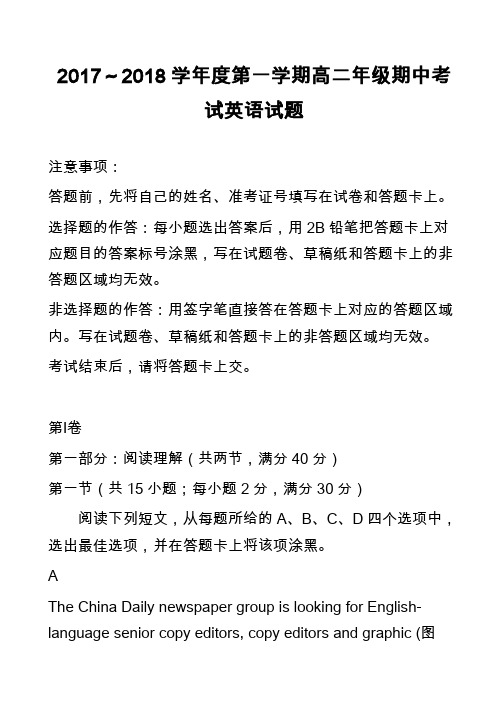
2017~2018学年度第一学期高二年级期中考试英语试题注意事项:答题前,先将自己的姓名、准考证号填写在试卷和答题卡上。
选择题的作答:每小题选出答案后,用2B铅笔把答题卡上对应题目的答案标号涂黑,写在试题卷、草稿纸和答题卡上的非答题区域均无效。
非选择题的作答:用签字笔直接答在答题卡上对应的答题区域内。
写在试题卷、草稿纸和答题卡上的非答题区域均无效。
考试结束后,请将答题卡上交。
第Ⅰ卷第一部分:阅读理解(共两节,满分40分)第一节(共15小题;每小题2分,满分30分)阅读下列短文,从每题所给的A、B、C、D四个选项中,选出最佳选项,并在答题卡上将该项涂黑。
AThe China Daily newspaper group is looking for English-language senior copy editors, copy editors and graphic (图表) designers to strengthen its international team. We offer a competitive salary package, free accommodation(膳宿)with utilities(公用事业)paid for 90 percent medical return, a seven-day paid leave, eleven-day public holidays and a return ticket to the country of reside nce.Senior Copy EditorYou must:*work on shifts in the Business Desk and usually have the last word before the page is sent to print;*edit or rewrite copy and give up-to-date headlines and captions(字幕);*have had at least two years’ editing experience working on ed iting desks and be familiar with industry software.Copy EditorYou must:*be good at editing or rewriting copy and writing snappy headli nes and captions;*be able to work on shifts for different pages, and usually have the last word before the page is sent to print;*have two years of editing experience working on copy desks a nd be familiar with industry software.Graphic DesignerYou must:*have excellent skills in information graphics;*be good at illustrations and freehand drawings;*be experienced in newspaper or magazine layouts;*have a good sense of typography;*have good news judgment;*be familiar with Macintosh software, including InDesign, Illustr ator and Photoshop;*be fluent in English.For enquiries, write to job@chinadaily. com. cn.1. What’s the meaning of the underlined words“ have the last word” in the third paragraph?A. Showing that the editor is forgetful.B. Showing that the editor has the right to make a decision.C. Meaning the editor is good at making a speech.D. Meaning the editor is bored with his work.2. What is not required about Graphic Designer?A. Be familiar with Photoshop.B. Have excellent skills in information graphics.C. Having a good sense of typography.D. Writing up-to-date headlines and captions.3. The author writes this passage to .A. advertise for employing some employeesB. describe the positions of the China Daily newspaper groupC. describe the working conditions of the China Daily newspa per groupD. tell you how to become good editors and designersBIn our home it was natural to fear our father. Even our mother was afraid of him. As children, my sister and I thought every f amily was like that—that every family had an unpredictable dad who was impossibl e to please and a praying mom who was there to protect the children. We were good children. Mom was always telling us w e were, even if daddy couldn’t see it.Then came the day we found something new and fun to do. We discovered we could draw pictures with chalk on our woo den front door. We could have lots of fun, so we set to work dr awing and making lots of pretty pictures all over it. We had a great time. We decided to finish our pictures, knowing Mom w ould just love them.The praise we expected did not come. We did not understand why, but we knew our parents were angry, and that we were i n big trouble!Off we ran to find a place to hide. In our wooded yard it was n ot hard for two small children to find safety. Together, we hid behind a tree and did not move. Soon we heard the frightened voices of Mom and our neighbors calling out to us. We were afraid we would be found. The sun set, and it began to get dar k, we heard another voice, one we recognized with great fear: our daddy. But there was something strangely different about it. In it we heard something we had never heard before: fear and despair. Our daddy with tears running down his face, pra yed to God for the safe return of his girls.[]Things were different after that. We had a new daddy; it was a s if the old one had been buried that day in the yard. Our whole family had been changed by one piece of chalk.4. The children drew pictures on the wooden front door in ord er to .A. improve their drawing skillsB. be praised by their moth er.C. make the door beautifulD. have fun5. Why didn’t the children come out when others were searchi ng for them?A. They were afraid of being punished.B. They wanted to make their father worry.C. They wanted to tell their parents that they were wrong.D. They wanted to stay there for the night.6. What happened while the children were hiding?A. The mother told the neighbors about it.B. The father came home early.C. The father became very angry.D. The children found it was interesting to do so.7. What can we infer from the passage?A. The father didn’t love his children.B. The father was too busy to talk with the children.C. The children weren’t afraid of their father after the incident.D. The family was afraid of the father because of his rudene ss.CHappy birthday! Do birthdays really make people happy? Of c ourse they do. Birthdays celebrate the day we were born. Bes ides, that extra candle on the cake suggests another year of g rowth and maturity—or so we hope. We all like to imagine that we’re getting wiser and not just older. Most of us enjoy seeing the miracle of grow th in others, as well. For instance, seeing our children develop and learn new things makes us feel proud. For Americans, lik e people in most cultures, growing up is a wonderful process. But growing old? That’s a different story.Growing old is not exactly pleasant for people in youth-oriented American culture. Most Americans like to look young, act young and feel young. As the old saying goes, “You’re as young as you feel.” Older people joke about how many years young they are, rather than how many years old. People in so me countries value the aged as a source of experience and wi sdom. But Americans seem to favor those that are young, or at least “young at heart”.Many older Americans find the “golden years” to be anything but golden. Economically, “senior citizens” often struggle just t o get by. Retirement at age 65 brings a sharp decrease in per sonal income. Social security benefits usually cannot make up the difference. Older people may suffer from poor nutrition, m edical care and housing. Some even experience age discrimi nation (歧视). In 1987, American sociologist Pat Moore dressed up like an older person and wandered city streets. She was often tre ated rudely—even cheated and robbed. However, dressed as a young pers on, she received much more respect.Unfortunately, the elderly population in America is increasing f ast. Why? People are living together. Fewer babies are being born. And middle-aged “baby boomers” are rapidly entering the groups of the el derly. America may soon be a place where wrinkles (皱纹) are “in”. Marketing experts are already noticing this group of consumers (消费者).8. The main ideaof the third paragraph is________.A. the golden years can make the old earn lots of moneyB. many old people in America are leading a hard lifeC. the old in America have to retire at the age of 65D. American social security benefits are not good9. From the last paragraph we know that the underlined word “in” can be replaced by________.A. seriousB. badC. disappearing slowlyD. growing fast10. From this passage we can know________.A. in America, growing up is not a wonderful processB. in America, growing up is as wonderful a process as gro wing oldC. in America, growing up is a wonderful process, while gro wing old is notD. in America, growing old is a wonderful process, while gro wing up is not11. What should be mentioned in the following paragraph?A. The public will change their attitudes towards old people.B. People will provide more services to the old in their com munities.C. Companies will soon produce more goods for old Americ ans.D. The government will pass laws to ensure the benefits of t he people.DNothing is more tiresome than being stuck in a boring class. E very second takes ages to tick by. A recent survey of America n kids revealed that 91 percent experience boredom. In fact, a dolescence is considered a peak period for the problem. One study showed that roughly one in three teenagers was bored at school.Peter Stromberg, professor at the University of Tulsa says, “O ur brains adapt really quickly to certain levels of stimulation(刺激). We get used to the media providing levels of highly emoti onal stimulation, and when we’re not getting them we feel bor ed. As our society develops various ways of keeping us entert ained, we may discover that rather than getting rid of boredo m, we’re increasing it.” Luckily, new research is implying a wa y that we can battle the trend.Professor John D. Eastwood of the University of York develop ed a new theory of boredom, which links it to the brain’s attent ion system—the part of the brain that we use to focus. Anything the attenti on system in your brain locks onto will be automatically sucke d up into your conscious awareness—it might be a bird outside the window, the pleasant smell of lunch, or even someone sleeping in the back of the class.The problem is that your attention system doesn’t like being to ld what to do. It wants to focus on stuff that you find fun and in teresting. For the parts of school that you enjoy, this isn’t a pr oblem. But for those classes that don’t interest you, or present too much or too little challenge, the story is very different. In t hose situations, you’re going to have to spend a lot of effort c onstantly redirecting your attention system to focus on things i t would rather ignore. And the effort is going to wear you out. Eastwood describes it as “wanting, but being unable, to be inv olved in a satisfying activity.”It’s like a block in the system. An d it’s the awareness of that block combined with a sense that t he environment is to blame that leads to feelings of boredom. When we’re bored we blame the world around us, but Eastwo od’s theory challenges this assumption: Boredom doesn’t exis t out there; it exists inside your brain. What that means is—hard as it may be to hear—boring lessons aren’t only the fault of your teacher or the subj ect, they’re your fault, too.12. According to Peter Stromberg, ________.A. teenagers are victims of boredomB. our brains demand much stimulationC. we’ve grown dependent on media for funD. the way we have fun makes us become bored13. According to Paragraph 4, the attention system ________.A. doesn’t like challengesB. enjoys interesting thingsC. does what you want it to doD. can make our efforts fruitle ss14. What might the author suggest about a boring class?A. Focusing more attention on it.B. Changing the way we look at it.C. Employing various teaching methods.D. Challenging the disturbing environment.15. What might be the best title for the passage?A. Escape Your BoredomB. Battle Your AttentionC. Fun or Boredom?D. Who Is to Blame?第二节(共5小题;每小题2分,满分10分)根据短文内容,从短文后的七个选项中选出能填入空白处的最佳选项。
2017—2018年度高二年级第一学期期中考试英语试卷

2017—2018年度高二年级第一学期期中考试英语试题(100分)注意事项:1.选择题答案必须填涂在答题卡上,写在试卷上的一律不计分。
2.答题前,考生务必将自己的姓名、准考证号、考试科目写在答题卡上。
3.考生须按规定要求正确涂卡,否则后果自负。
一、语音(本大题共15小题,每小题1分,共15分)(一)从A、B、C、D四个选项中,选出划线部分发音不同的一项。
1.A.avoid B.afraid C.ashamed D.gladly2.A.nod B.honestly e D.cross3.A.factor B.social C.cloth D.music4.A.means B.jeans C.result D.steal5.A.human B.rush C.upstairs D.jump6.A.whenever B.whole C.whose D.whom7.A.trouble B.doubt C.cloud D.proud8.A.cheap B.stomach C.chance D.cheerful9.A.choosy B.mood C.foot D.food10.A.work B.form C.normal D.order11.A.thus B.father C.maths D.rather12.A.wear B.pear C.earn D.bear13.A.relationship B.suggestion C.emotion D.conversation14.A.weight B.tight C.light D.cough15.A.cowboy B.down C.low D.brown二、单项选择题(本大题共30小题,每小题1分,共30分)从A、B、C、D 四个选项中,选出空白处的最佳选项。
16.I have some trouble_______ English in the USA.A.understandB.understandingC. to understandD.understood17.She pretended________ me when I said hello to her.A.not to hearB.to not hearC.not hearD.not hearing18.We communicate with each other _________ language.A.with means ofB.with means toC.by means ofD.by means to19.We should get up early _______ we can catch the first bus.A.so thatB.in order toC.so as toD.such that20._________ our teacher has told us the answer, some students still made a mistake.A.AlthoughB.BecauseC.IfD.So21.He won’t tell me the truth _______ he knows all about it.A.becauseB.even ifC.evenD.if22.He ______up very late in the morning, but now he_____up very earlyed to get;is used to geted to getting;is used to getC.is used to getting;used to geted to get;is used to getting23.Do you have _______ to tell me?A.something importantB.important somethinC.anything importantD.important anything24.---I’m too busy_______ to my family often.---Why not call them instead?A.writingB.to writeC.writtenD.write25.The result of the test was rather _____.A.disappointedB.disappointingC.being disappointedD.disappoint26.I had to shout to make myself _____ above the noise.A.heardB.hearingC.hearD.tohear27.________ time, he’ll make a first-class tennis player.A.Having givenB.To giveC.GivingD.Given28. We must have the work ______before 10 o’clock.A.finishB.to finishC.finishedD.finishing29. He prefers ______ to ______.A.swim;skateB.swimming; skatingC.swimming; skateD.swim; skating30.______, jeans became fashionable.A.In 1950sB.In 1950’sC.In the 1950sD.In a 1950s31.Why do they wear _____ the trousers so quickly.A.inB.outC.forD.with32.China is a ______ country.A.developingB.developC.developedD.being developed33. The classroom needs ______.A.cleanB.cleanedC.to cleanD.cleaning34.In the chidren’s minds ,summer ______picnics.A.is associated byB.is associated withC.associated byD.associated with35.We expected you ________here for a long time.A.stayingB.to stayC.staysD.stay36.When a person is in low spirits,he is ____.A.in a good moodB.in a bad moodC.cheerfulD.excited37.---- Here ____! Where is Xiao Liu!----There ____.es the bus; is hees the bus;he isC.the bus comes; is heD.the bus comes; he is38. Not only ____working hard,but also ____ very polite.A.the boy is;he isB.is the boy;he isC.the boy is;is heD.is the boy;is he39.Never _________seen such a big mouse.A.I haveB.have IC.I havingD.having I40.I_____myself for being unable to pay back the money.A.am ashamedB.am ashamed ofC.ashamed withD.ashamed of41.I found the work was very difficult._____,I was wasting my time.A.in other wordsB.in another wordsC.in a wordD.in words42.If a road is being repaired, we may say, “The road is ____repair.”A.underB.out ofC.in goodD.beyond43.---Is my watch on the desk?---No, there is ____.A.isn’t nothingB.is nothingC.is anythingD.isn’t nothing44.If you need money, I’ll lend you ______.A.oneB.fewC.a fewD.some45. ---How many books on the table?---_____________A.NoneB.No oneC.NoD.Nobody三、完型填空(本大题共10小题,每小题1分,共10分)从A、 B 、C、 D 四个选项中,选出空白处的最佳选项。
2017-2018学年高二英语上学期期中试题_68
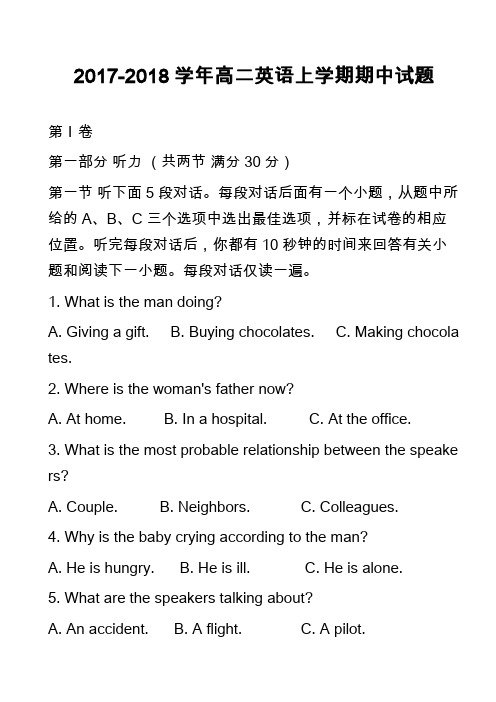
2017-2018学年高二英语上学期期中试题第I卷第一部分听力(共两节满分30分)第一节听下面5段对话。
每段对话后面有一个小题,从题中所给的A、B、C 三个选项中选出最佳选项,并标在试卷的相应位置。
听完每段对话后,你都有10秒钟的时间来回答有关小题和阅读下一小题。
每段对话仅读一遍。
1. What is the man doing?A. Giving a gift.B. Buying chocolates.C. Making chocola tes.2. Where is the woman's father now?A. At home.B. In a hospital.C. At the office.3. What is the most probable relationship between the speake rs?A. Couple.B. Neighbors.C. Colleagues.4. Why is the baby crying according to the man?A. He is hungry.B. He is ill.C. He is alone.5. What are the speakers talking about?A. An accident.B. A flight.C. A pilot.第二节听下面5段对话或独白。
每段对话或独白后有几个小题,从题中所给的A、B、C 三个选项中选出最佳选项,并标在试卷的相应位置。
听每段对话或独白前,你将有时间阅读各个小题,每小题5秒钟;听完后,各小题将给出5秒钟的作答时间。
每段对话或独白读两遍。
请听第6段材料,回答第6、7题。
6. When should Tom be back?A. At 7:30.B. At 7:00.C. At 6:30.7. How did Tom go to school today?A. By bus.B. By motorcycle.C. By bike.请听第7段材料,回答第8、9题。
2017-2018学年高二英语上学期期中试题_82
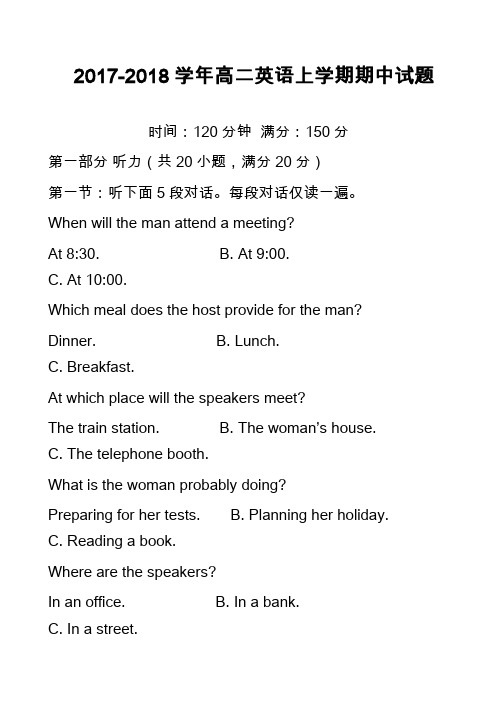
2017-2018学年高二英语上学期期中试题时间:120分钟满分:150分第一部分听力(共20小题,满分20分)第一节:听下面5段对话。
每段对话仅读一遍。
When will the man attend a meeting?At 8:30. B. At 9:00.C. At 10:00.Which meal does the host provide for the man?Dinner. B. Lunch.C. Breakfast.At which place will the speakers meet?The train station. B. The woman’s house.C. The telephone booth.What is the woman probably doing?Preparing for her tests. B. Planning her holiday.C. Reading a book.Where are the speakers?In an office. B. In a bank.C. In a street.第二节:听下面5段对话或独白。
每段对话或独白读两遍。
听第6段材料,回答6—7题。
6. What does the girl think of Spanish?A. It’s OK.B. It’s difficult.C. It’s boring.7. Which subject does the girl like best?A. Math.B. English.C. History.听第7段材料,回答8—9题。
8. What are the speakers mainly talking about?A. Unemployment.B. Future way of working.C. Home activities.9. What does the woman like doing at home?A. Sending friends e-mails.B. Doing housework.C. Watching TV.听第8段材料,回答10—12题。
- 1、下载文档前请自行甄别文档内容的完整性,平台不提供额外的编辑、内容补充、找答案等附加服务。
- 2、"仅部分预览"的文档,不可在线预览部分如存在完整性等问题,可反馈申请退款(可完整预览的文档不适用该条件!)。
- 3、如文档侵犯您的权益,请联系客服反馈,我们会尽快为您处理(人工客服工作时间:9:00-18:30)。
桐乡市凤鸣高级中学2017学年第一学期期中考试
高二年级英语试卷
考生须知:1. 全卷分试卷和答卷。
试卷共 8 页,有 4 大题, 65 小题,满分150分,考试时间 120 分钟。
2. 本卷全部答案必须做在答题卷的相应位置上,做在试题卷上无效。
1—55题
请填涂到机读卡上, 其中,31-35题涂在61-65题,其他按题号涂。
第Ⅰ卷
第一部分听力(共两节,满分30分)
第一节(共5小题;每小题1.5分,满分7.5分)
听下面5段对话。
每段对话后有一个小题,从题中所给的A、B、C三个选项中选出最佳选项。
听完每段对话后,你都有10秒钟的时间来回答有关小题和阅读下一小题。
每段对话仅读一遍。
1. What was the weather like when Beth was at the beach?
A. Cloudy.
B. Sunny.
C. Rainy.
2. What will the man do next Friday?
A. Attend a party.
B. Go on a business trip.
C. E-mail the woman a report.
3. How did the woman hear about the wedding?
A. Simon told her face to face.
B. She got the invitation.
C. Bettina phoned her.
4. Where does the conversation take place?
A. At a restaurant.
B. At home.
C. At a supermarket.
5. What are the speakers mainly talking about?
A. What the apartment manager is like.
B. When the man met the apartment manager.
C. Whether the man likes the apartment manager.
第二节(共15小题;每小题1.5分,满分22.5分)
听下面5段对话或独白。
每段对话或独白后有几个小题,从题中所给的A、B、C三个
选项中选出最佳选项。
听每段对话或独白前,你将有时间阅读各个小题,每小题5秒钟;听完后,各小题将给出5秒钟的作答时间。
每段对话或独白读两遍。
听第6段材料,回答第6至7题。
6. What does the man think of his job?
A. Boring.
B. Enjoyable.
C. Challenging.
7. What does the man’s sister do?
A. A travel agent.
B. A hotel manager.
C. A university student. 听第7段材料,回答第8至10题。
8. What does the woman offer to do for the man?
A. Take him to a dance party.
B. Send him back to the hotel.
C. Show him around New Orleans.
9. How did the man come to meet the woman?
A. By taking a boat.
B. By taking a streetcar.
C. By walking there.
10. What does the man want to do?
A. Go to a jazz club.
B. Boat on the river.
C. Have a rest.
听第8段材料,回答第11至13题。
11. What color is the man’s shirt now?
A. Bright red.
B. Light pink.
C. Bright pink.
12. How did the man wash his shirt?
A. He had it dry-cleaned.
B. He washed it by hand.
C. He washed it in a washing machine.
13. What will the man probably do in the end?
A. Keep his shirt.
B. Return his shirt.
C. Change his shirt.
听第9段材料,回答第14至17题。
14. What do we know about the man?
A. He has been to the hotel before.
B. Someone booked the hotel for him.
C. He has once changed his name.。
